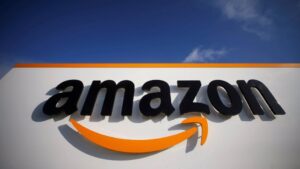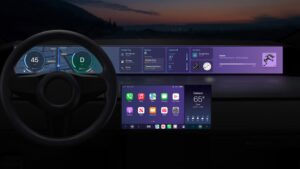15th December 2023 – Radio Free Mobile extends its coverage of the automotive digital ecosystem with the publication of Automotive Ecosystem – Sitting Ducks Vol. IV – Services.
RFM research subscribers will receive their copy by email
The OEMs face a far smaller market for vehicles which will threaten their existence. The good news is that they have a great opportunity to replace lost profits from vehicles with profits from digital vehicle services. However, to achieve this they must control the app store in their vehicles and remain digitally relevant. This will be no small feat as both Apple and Google will be more than happy to turn them into smartphones on wheels. Digital oblivion will be the price of failure.
- Substantial decline. The main driver of vehicle demand is miles driven. EVs can drive 2.5x more miles than a petrol vehicle before being replaced meaning that without a dramatic increase in miles driven, demand for vehicles could fall by 60% over the next 20 years.
- No fix in sight. With miles being much cheaper to drive, demand should increase materially but without autonomy, this is very unlikely. This is because road congestion will prevent miles driven by humans from increasing. Even with a full roll-out of autonomy driving a 40% increase in miles driven, vehicle demand would still be 30% less in 2047 than it was in 2023.
- OEMs need digital services to survive. By 2040 digital services in the vehicle could be worth $1.7tn while digital advertising could be worth around $61bn. Advertising is not big enough meaning that the OEMs must access digital vehicle services to make ends meet.
- Business model. There is a high likelihood that the business model of the smartphone will be replicated in the digital vehicle. There are two revenue streams. First, the monetisation of the ecosystem and secondly the share of revenues earned from distributing apps and services.
- The digital ecosystems view the vehicle as just another device to be digitised as this gives them both a new revenue opportunity as well as greater stickiness for their ecosystems in terms of running across multiple devices. They will be more than happy to turn OEMs into smartphones on wheels.
- Google is the least threatening of the two major Western ecosystems. This is because it will pay a share of the digital advertising revenue that it earns in the vehicle to the OEM in terms of traffic acquisition cost. The problem is that this will be less than 25% of what OEMs need.
- Apple’s business model threatens to turn OEMs into no more than app developers. Should Apple take over the infotainment unit, then the OEMs will receive nothing.
- The app store is the key to success for OEMs as they must control app and service distribution to vehicle users to earn the revenue share that they need to offset falling vehicle sales. To have a relevant app store, they must remain digitally relevant in terms of the user experience. Using Android without Google services as the OS for the infotainment unit remains their best option for both the user experience and the app store.









Automotive Ecosystems – Pl ...
30 April 2024